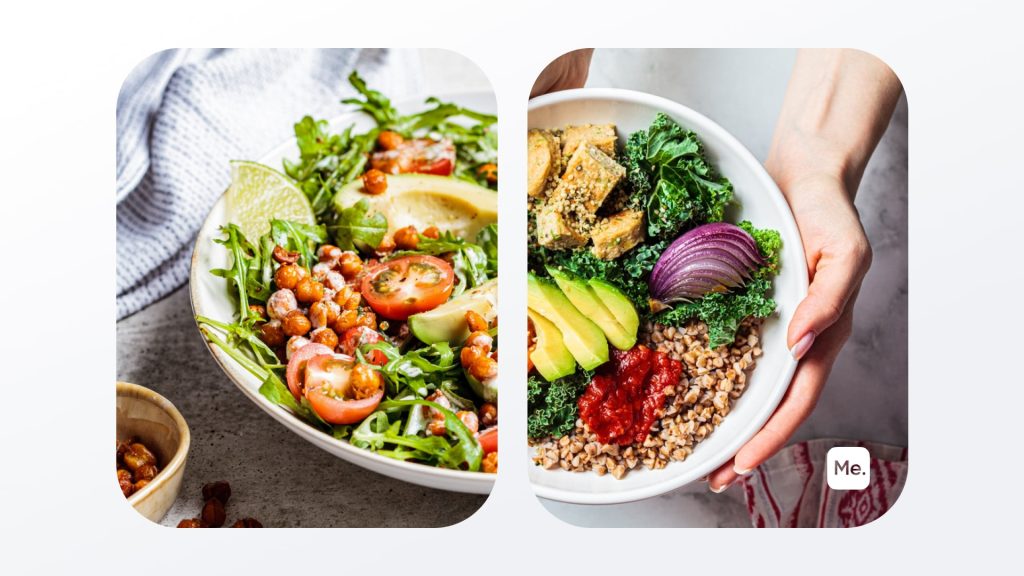If the words nitrites and nitrates conjure up visions of chem labs and high school science class for you, then you’re not alone. Many people didn’t realize that these chemicals can actually be found in many of our everyday foods. Lately, these two nitrogen-containing compounds are in the news again because of their potential role in human health. They’ve been linked to cancer, however, their connection is a little bit complicated. So, what is the difference between nitrate and nitrite? Which is worse? And what does all of this mean for your health?
The Difference Between Nitrites And Nitrates
Nitrites and nitrates are both nitrogen-containing compounds. The difference between them is their number of oxygen atoms present. Nitrites have two oxygen atoms, while nitrates have three (6).
Having two oxygen atoms makes nitrites more chemically reactive than nitrates. In other words, nitrites can interact with other chemicals more easily than nitrates. This difference seems small, but it may actually have big implications for human health (6).
To completely understand how nitrites and nitrates can impact our health, it’s important to know a little bit about their chemistry.
Read More: Pea Milk Nutrition, Health Benefits And Side Effects
The Chemistry Of Nitrites And Nitrates
When we eat foods that contain nitrates (such as leafy greens, beets, and carrots), our bodies mostly excrete them as nitrates, but some are converted into nitrites. Once they’re in our bodies, nitrites can then be converted into other important chemicals, like nitric oxide (6).
Nitric oxide is a gas that has many important functions in the human body. It helps regulate blood pressure, keeps the lining of our blood vessels healthy, and even plays a role in brain function. This means nitrates and nitrites are not inherently harmful for our health. However, problems with nitrites and nitrates arise when they are used as food additives.
The Use Of Nitrites And Nitrates As Food Additives
Nitrates and nitrites are often added to processed meats, like bacon, hot dogs, and lunch meats. They’re added for three main reasons: to preserve the meat, improve its flavor, and give it a pink or red color (5).
When nitrites are added to meat, they help prevent the growth of harmful bacteria. This is important because meat can spoil quickly and may cause food poisoning. Nitrites also react with the protein in meat to create a distinct flavor that many people enjoy. Finally, nitrites give processed meats their pink or red color that makes it even more visually appealing.
While some amount of nitrites and nitrates, especially when they are naturally occurring in plant foods, is not harmful for our health, there is some concern that consuming them in processed meats may be harmful. In the presence of high heat (grilling or frying) and chemicals called amines (which are found in meat), nitrites can form compounds called nitrosamines (5).
Some nitrosamines are known to be carcinogenic, which means they can cause cancer. In animal studies, high levels of nitrosamines have been linked to cancer of the stomach, colon, and pancreas. However, it’s important to remember that these studies were done on animals, not humans.
The jury is still out on whether or not nitrosamines formed from nitrites and nitrates in processed meats can cause cancer in humans. Some studies have found a link between consuming processed meats and an increased risk of cancer, while other studies have found no link.
The International Agency for Research on Cancer (IARC) has classified red meat as a “probable human carcinogen” (1). This means there is limited evidence to show that they can cause cancer in humans, but the evidence is strong enough that the IARC believes there is a connection.
The agency, which is part of the World Health Organization (WHO), has also classified processed meat as a “definite human carcinogen”. This means there is enough evidence to show that there is a strong link between consuming processed meats and an increased risk of cancer (1). So, what does all of this mean for your health?
BetterMe app will provide you with a host of fat-frying fitness routines that’ll scare the extra pounds away and turn your body into a masterpiece! Get your life moving in the right direction with BetterMe!
Health Benefits Of Nitrites And Nitrates
Despite the concerns about processed meats, it’s important to remember that nitrates and nitrites are not inherently harmful for our health. The saliva in our mouths contains bacteria that convert nitrates into nitrites.
Once they’re in our bodies, nitrites may offer the following health benefits:
1. Cardiovascular Regulation
When derived from plant foods, nitrites are thought to help regulate blood pressure by dilating (widening) our blood vessels. This allows more blood to flow through them and lowers our blood pressure (2).
2. Might Improve Brain Function
Increasing dietary nitrate intake has been suggested as a strategy to improve brain function in older adults, because it is a nitric oxide precursor. While there were some promising early findings, one recent review found insufficient evidence at this time to recommend increasing dietary nitrate intake for the purpose of improving brain health. Perhaps further research will provide more clarity.
3. Reversal Of Metabolic Syndrome
Metabolic syndrome is a condition that’s characterized by high blood pressure, high blood sugar, and abdominal fat. Nitrites converted into nitric oxide might help reverse the symptoms of metabolic syndrome by dilating blood vessels, improving insulin sensitivity, and reducing inflammation (2). However, the current evidence for this is primarily based on animal studies.
4. May Improve Exercise Performance
Nitric oxide can dilate blood vessels, which may improve blood flow and help deliver more oxygen to our muscles. This might lead to improved exercise performance, especially in people who are deficient in nitrites (2).
5. May Support Immunity
Dietary nitrates and nitrites may also play a role in modulating the immune system and inflammatory response (2).
6. Wound Healing
Nitric oxide is thought to play an important role in wound healing (2).
7. Helps Maintain Oral Health
Nitrites may help prevent gum disease and dental caries by inhibiting the growth of bacteria in the mouth (2).
Read More: What Are The 6 Nutrition Groups And Why Should You Care?
How To Get More Benefits And Less Risk?
If you’re concerned about the potential risks of processed meats, there are a few things you can do to minimize your risk:
Eat More Leafy Greens
The type of vegetables that are highest in nitrates are leafy greens, such as spinach, arugula, and kale. High intakes of fruits and vegetables tend to be associated with lower risks of cancer, including the types which are associated with processed meat intake (3).
Limit Consumption Of Processed Meats
If you do eat processed meats, limit them to no more than two servings per week. When choosing processed meats, look for brands that are labeled “nitrate-free” or “uncured” (4).
Note that other types of curing, such as celery juice powder, can still contain high levels of nitrates.
Read Nutrition Labels
To know whether processed meat contains nitrates or nitrites, you’ll need to read the nutrition label. Ingredients that end in “-nitrate” or “-nitrite” are forms of these chemicals.
Common names for nitrates include:
- Potassium nitrite (E249)
- Sodium nitrite (E250)
- Sodium nitrate (E251)
- Potassium nitrate (E252)
Cook At Low Temperatures
When cooking any type of meat, cook it at low temperatures to reduce the formation of nitrosamines. Cooking your bacon in a microwave instead of frying it, for example, can reduce the formation of nitrosamines.
Other tips for cooking meat include:
- Use lean cuts of meat to reduce the amount of fat.
- Avoid charring meat by cooking it until it’s just done, not overcooked.
- If using a barbecue, cook meat on a lower rack to avoid charring.
- Continuously turn and baste the meat with a marinade to keep it moist.
- Remove any charred bits before eating.
Avoid Cured Meats During Pregnancy
If you’re pregnant, it’s often recommended to avoid cured meats and deli meats altogether. This is because of the risk of listeria, which can be very harmful to the fetus.
Betterme will keep you laser-focused on your weight loss journey! Nutrient-packed meal plans, fat-blasting workouts, galvanizing challenges and much more. Try using the app and see for yourself!
Frequently Asked Questions
Below are some frequently asked questions about nitrites and nitrates.
Q: How Does Nitrate Become Nitrite?
A: Nitrate is converted to nitrite by bacteria that are naturally present in our mouths and GI tracts.
Q: Which Is Worse, Nitrate Or Nitrite?
A: Nitrates are stable and not harmful on their own. Nitrites, on the other hand, can interact with other compounds to form carcinogenic (cancer-causing) nitrosamines. They can also be converted to nitric oxide, which has some health benefits.
Q: Why Are Nitrates And Nitrites Bad For You?
A: At high levels, nitrates and nitrites may be toxic. They can also interact with other compounds to form carcinogenic (cancer-causing) nitrosamines.
Q: What Foods Are High In Nitrates?
A: The type of vegetables that are highest in nitrates are leafy greens, such as spinach, arugula, and kale. Processed meats, such as bacon and ham, are also high in nitrates.
Q: How Much Nitrate Is Safe?
A: The European Food Safety Authority sets the acceptable daily intake of dietary nitrates at 3.7 mg per kg of body weight per day. The level for nitrite is 0.07 mg/kg/day.
Q: How Can I Avoid Nitrates And Nitrites?
A: You can minimize your exposure to added nitrates and nitrites by eating more leafy greens and other plant-based foods, limiting processed meats, cooking meat at low temperatures, and avoiding cured meats during pregnancy.

The Bottom Line
Nitrites and nitrates are not inherently bad for our health, but consuming them in processed meats may be harmful. If you’re concerned about the potential risks, you can limit your intake of processed meats or avoid them altogether. You can also look for nitrite-free products.
When it comes to nitrites and nitrates, it’s important to remember that moderation is key. These compounds may be positive for our health when they are naturally occurring in plant-based foods, but consuming too much of them may be harmful. As with anything, it’s important to strike a balance.
DISCLAIMER:
This article is intended for general informational purposes only and does not address individual circumstances. It is not a substitute for professional advice or help and should not be relied on to make decisions of any kind. Any action you take upon the information presented in this article is strictly at your own risk and responsibility!
SOURCES:
- Cancer: Carcinogenicity of the consumption of red meat and processed meat (2015, who.int)
- Food sources of nitrates and nitrites: the physiologic context for potential health benefits (2009, nih.gov)
- Health Benefits of Fruits and Vegetables (2012, nih.gov)
- Limit red and processed meat (n.d., wcrf.org)
- Nitrites and nitrates added to food (2017, europa.eu)
- Nitrate and nitrite in biology, nutrition and therapeutics (2014, nih.gov)















